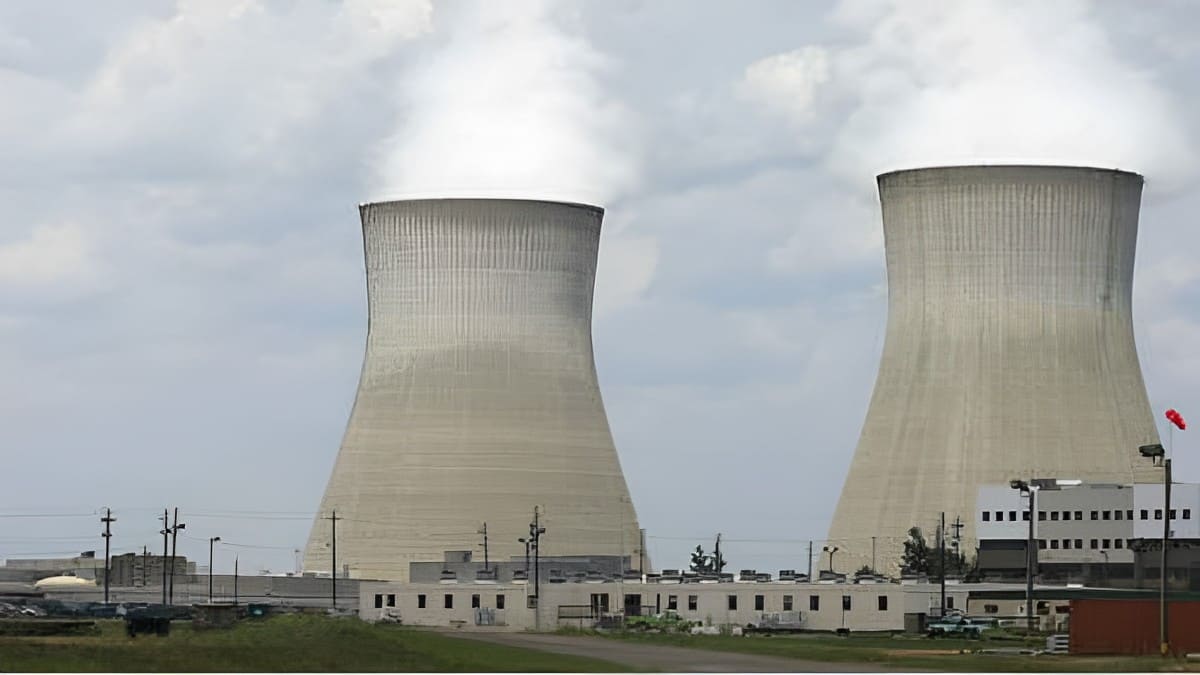Key Points of NTPC and NPCIL Join Forces:
- NTPC and NPCIL have signed a supplemental joint venture agreement for the development of nuclear power projects in India.
- The Chutka Nuclear Power Project and the Mahi Banswara Nuclear Power Project are two pressurised heavy-water reactor (PHWR) projects designated as fleet mode nuclear projects.
- NTPC plans to produce nuclear energy at 2,000 MW by 2032, 4,200 MW by 2035, and 20,000 MW by 2050.
- NTPC plans to expand nuclear capacity using PHWRs and small modular reactors and collaborate with Uranium Corporation of India Ltd. on fuel projects.
- The Indian government has given approval for ten nuclear reactors to be installed at four sites.
- The ten reactors will produce 7,000 MW (7 GW) and be put into “fleet mode” by 2031 at a cost of Rs. 1,05,000 crores.
- The nuclear projects at Chutka and Mahi Banswara will be carried out by ASHVINI, a joint venture between NTPC Ltd and NPCIL.
- India’s installed nuclear power capacity is currently just 2% of the entire energy mix in the nation, which comprises thermal, hydroelectric, and renewable sources.
Details of NTPC and NPCIL Join Forces:
On May 1, NTPC Ltd. and Nuclear Power Corporation of India Ltd. (NPCIL) inked a supplemental joint venture (JV) agreement for the advancement of nuclear power projects in the nation.
The Chutka Nuclear Power Project in Madhya Pradesh and the Mahi Banswara Nuclear Power Project in Rajasthan are two pressurised heavy-water reactor (PHWR) projects that were designated as fleet-mode nuclear projects, according to a statement by NTPC.
The largest power producer in India, NTPC, plans to begin producing nuclear energy at 2,000 MW by 2032, 4,200 MW by 2035, and ultimately 20,000 MW by 2050.
In addition to expanding nuclear capacity using pressurised heavy water reactors (PHWR), NTPC also intends to do so using small modular reactors. To guarantee the supply of the necessary feedstock, it also plans to collaborate with Uranium Corporation of India Ltd. on fuel projects.
According to Jitendra Singh, the Union Minister of State (independent charge) for Earth Sciences, Atomic Energy, and Space, the government has given the go-ahead for the installation of ten nuclear reactors to address the nation’s rising energy needs.
By the year 2031, these reactors would gradually be put into “fleet mode” at a cost of Rs. 1,05,000 crores. These reactors are anticipated to produce a combined 7,000 megawatts (MW) or 7 gigawatts (GW). The 10 reactors will be deployed at four sites: four at Mahi Banswara (Rajasthan), two each at Kaiga (Karnataka), Gorakhpur (Uttar Pradesh), and Chutka (Madhya Pradesh).
Of these, ASHVINI, a joint venture between NTPC Ltd and NPCIL, will carry out the nuclear projects at Chutka and Mahi Banswara. The Chutka plant will cost around Rs 25,000 crore, while the Mahi Banswara facility will cost approximately Rs 50,000 crore.
“This supplementary joint venture agreement marks an important step for NTPC Ltd. and NPCIL to collaborate and cooperate in the field of developing nuclear power projects, which shall help the country meet its clean energy commitments to achieve net zero emission by 2070 target,” NTPC stated.
According to data from the Central Electricity Authority, India’s installed nuclear power capacity is just 6,780 MW, or 2% of the entire energy mix in the nation (comprising thermal, hydroelectric, and renewable sources).
A clean energy source with no emissions is nuclear. It produces energy through fission, which is the breaking of uranium atoms to release energy. Without the toxic byproducts that are created by burning fossil fuels, energy is produced by using the heat from fission to create steam, which turns a turbine.
About NTPC:
NTPC Limited, previously named National Thermal Power Corporation, is a central Public Sector Undertaking in India. It operates under the ownership of the Government of India’s Ministry of Power and is involved in generating electricity and related activities. The company is headquartered in New Delhi.
About NPCIL:
The Nuclear Power Corporation of India Limited (NPCIL) is a public sector undertaking in India with its headquarters located in Mumbai, Maharashtra. The company is entirely owned by the Government of India and is tasked with generating electricity from nuclear power. NPCIL operates under the administration of the Department of Atomic Energy.
For More Latest News Click Here




